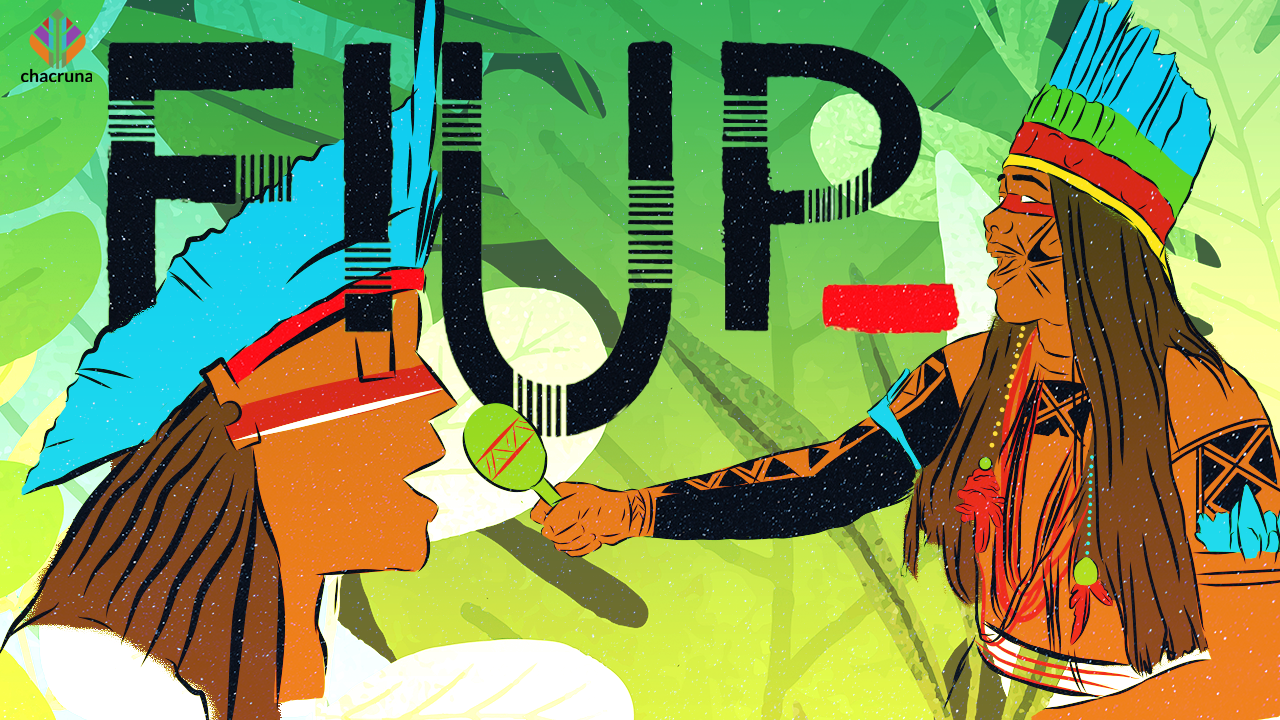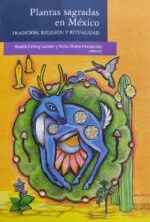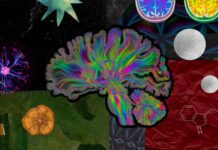- United in Fight and Celebration: The 3rd Indigenous Peoples Union Festival - June 12, 2025
- DEA Under Fire: Inefficiency or Resistance? - January 23, 2025
- Where Is the Psychedelic Movement Headed Next? - October 15, 2024
The 3rd Festival Indígena União dos Povos (Indigenous Peoples Union Festival – FIUP) held in May 2025 was more than a cultural event: it was a living manifesto of the resistance, diversity and strength of Brazil’s Indigenous peoples. Held with the presence of representatives from 20 ethnic groups, the festival consolidated itself as a space for reaffirming identities, denouncing violence, and building paths for the future based on traditional knowledge.
For several days, the festival pulsed with the ancestral energy of songs, dances and rituals. Right at the opening, a Guarani chant blessed the space and connected those present. In the midst of the festivities, the awareness of the struggle was clear: “We’re celebrating, but we know we’re at war,” said one of the leaders present. Chief Karai Djekupe, of the Guarani people, summed up this spirit when he said: “Where there are Indigenous people, there is standing forest.”
The festival opened with space for Indigenous youth. The Arandu Mirim collective highlighted the role of digital media as a tool for cultural preservation. For these young communicators, “the camera is an arrow” – an instrument of resistance that records, strengthens and shares ancestral knowledge with the world.
The Arandu Mirim collective highlighted the role of digital media as a tool for cultural preservation. For these young communicators, “the camera is an arrow” – an instrument of resistance that records, strengthens and shares ancestral knowledge with the world.
In the first round of talks, the role of Indigenous women was at the center of the debate. Federal deputy Célia Xakriabá spoke strongly about violence against Indigenous women and condemned Brazil’s institutional racism. She emphasized that environmental and gender justice are inseparable, pointing out that the climate crisis is also a women’s crisis. “Without women, there is no climate,” she said, emphasizing the centrality of women in the struggle for life.
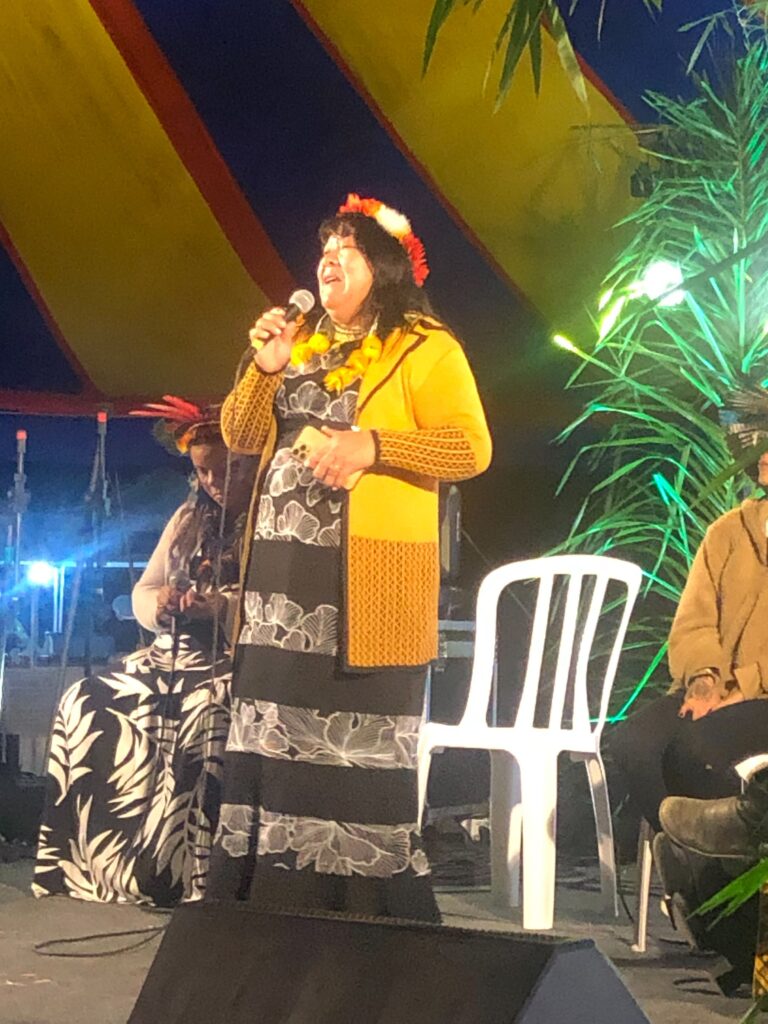
Txai Suruí, one of the leading young Indigenous activists, shared the legacy of her people and her work with reforestation and ethno-tourism. For her, the fight against colonial threats involves valuing culture and acting with an eye on future generations. Joenia Wapichana, the current president of the Fundação Nacional dos Povos Indígenas (National Indigenous Peoples Foundation – FUNAI) and the country’s first Indigenous lawyer, recounted her struggle, highlighting how the recognition of Indigenous rights also involves producing jurisprudence that is sensitive to cultural diversity. She also drew attention to the challenges of Indigenous education, with precarious schools and students forced to leave their communities to study. For Joenia, each individual achievement is a collective victory: “It’s not about me, it’s about all of us.”
The Festival also gave space to art as a spiritual and political language. The dance performance by Bahian artist Itamar dos Anjos delighted the audience by breaking Western patterns and opening up paths to a contemporary Indigenous aesthetic.
The second round of talks, on medicinal plants and accessibility, strengthened the sometimes tense dialog between science, spirituality, and ethics. Francisquinha Shawãdawa reminded us that there is no separation between healing and spirituality, and that medicinal plants are living beings with whom we must establish a respectful relationship. Her call for female protagonism in the use of forest medicines was echoed by Cunhã Dju, a Tupi Guarani woman, who criticized the superficial use of ancestral knowledge in courses and practices without spiritual preparation: “Plants heal, but they also kill.”
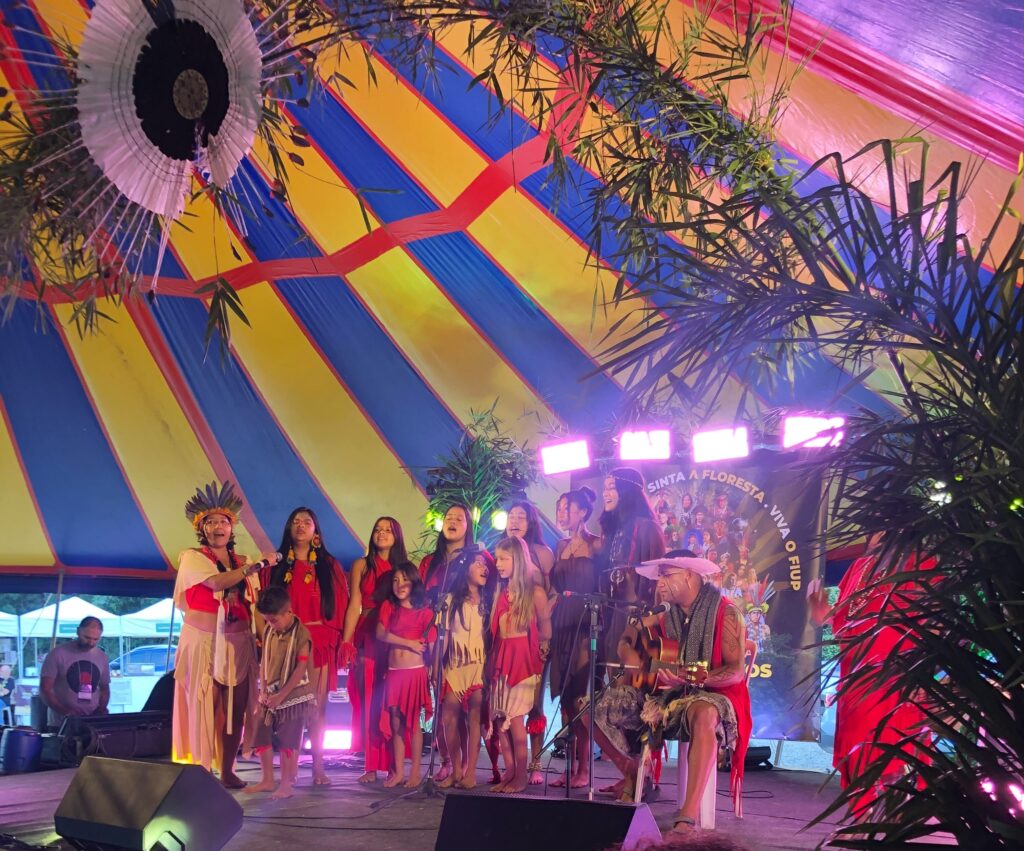
Randy Chung Gonzales brought the perspective of a forest medicine apprentice, emphasizing that the knowledge belongs to the plants and requires years of physical, emotional and spiritual preparation. He warned of the risk of trivialization and stressed the responsibility of those who deal with this knowledge. His chants – ícaros – evoked the strength of Indigenous women and the protective spirits of the forest.
On the academic side, psychiatrist Luis Tófoli (UNICAMP) acknowledged the limits of Western science and defended the need to “heal science” so that it learns to dialogue with Indigenous knowledge on an equal footing. Tófoli defended Brazil’s potential to lead this new form of knowledge production based on mutual respect. Lúcia Alberta Baré, public manager at FUNAI, denounced the advance of patent applications on Indigenous knowledge and stressed the importance of protecting traditional knowledge through public policies, such as the construction of an Indigenous university. “We have Indigenous scientists, but we also have native scientists – those whose science is born from their experience and their territory.”
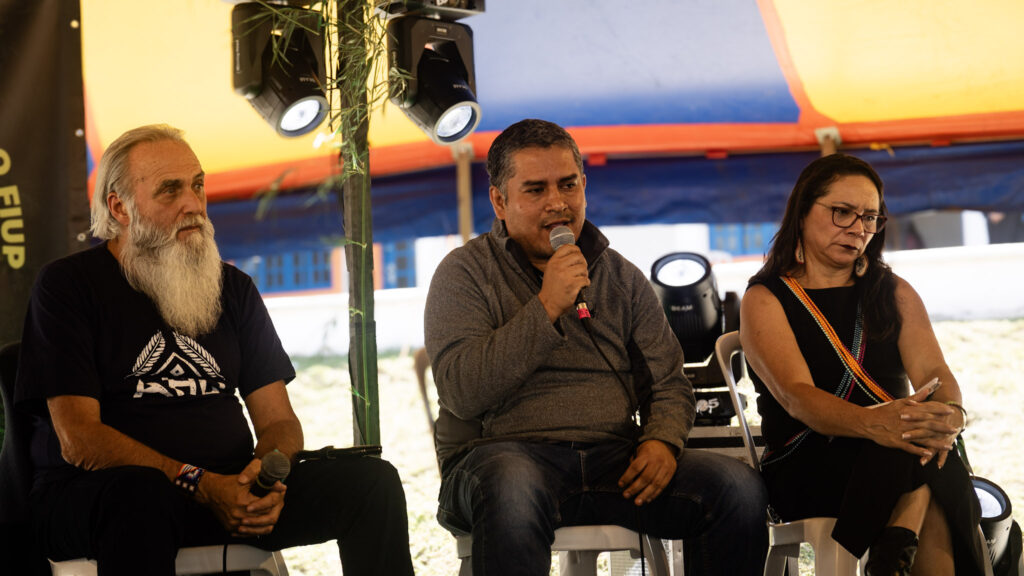
Tashka Yawanawá spoke about the revival of Indigenous medicines, despite the historical processes of erasure. He warned of the danger of colonial interpretations of the origin of ayahuasca, such as those that try to link it to biblical traditions: “That’s disrespect. Erasure.” For him, dialogue between Western and ancestral sciences is possible, as long as each is respected on its own terms.
The third round of talks dealt with the climate emergency. Neidinha Surui presented alarming data on deforestation in the state of Rondônia and defended the inclusion of the LGBTQIA+ population. “Diversity is also ecology,” she said. Célia Xakriabá warned of the mental health crisis among Indigenous peoples, aggravated by the denial of rights and the destruction of territories. Joenia Wapichana concluded by recalling that the warnings about global warming came from the shamans long before they were recognized by science. “We are dealing with the effects of a system that refuses to listen to those who have been taking care of the land since immemorial times.”
“We are dealing with the effects of a system that refuses to listen to those who have been taking care of the land since immemorial times.”
Joenia Wapichana
One of the most eagerly awaited and impactful activities of the event was the discussion “Exploitation of Indigenous Traditions – Cultural Appropriation and the Use of Ayahuasca in an Urban Context.” Bringing together powerful voices from different territories and experiences, it provoked profound reflections on the risks of trivializing forest medicines and the urgency of protecting ancestral knowledge in the face of the commercial expansion of this ancestral knowledge.
Ninawa Pai da Mata, a Huni Kuin leader from the Humaitá River, opened with a call to conscience. He denounced the decontextualized use and indiscriminate sale of ayahuasca, as well as urban therapeutic use without consulting the guardian peoples. For him, the forest is at once a school, a pharmacy and a spiritual temple—treating it as merchandise is profoundly disrespectful. Ninawa exposed practices of biopiracy, the misuse of Indigenous names by institutions and commercial brands, and even the appropriation of their language, as in the case of “Haux” beer. He called for the creation of an autonomous Indigenous council to protect these medicines and recalled that Brazil still knows very little about the spiritual depth of its peoples. “This needs to change urgently,” he said.
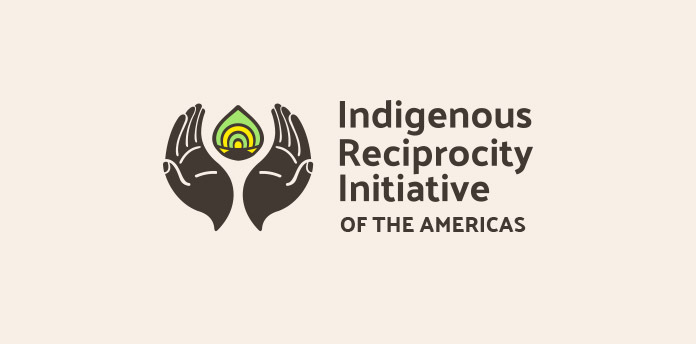
Discover the Indigenous Reciprocity Initiative of the Americas
This concern was echoed by Rasu Yawanawá, a young leader of the Yawanawá people of Rio Gregório in Acre, who reflected on the role of the new generation in protecting ancestral spirituality. Rasu stressed that ayahuasca is a medicine that should be used with preparation, respect, and responsibility, never as an instrument of self-promotion or commerce. He criticized those who appropriate the name of their people without the backing of their leaders, and recalled that spirituality is no joke: it is a path that requires humility and listening. “Everything that is sacred has its strength. It’s up to us to plant good seeds,” he said, in a tone of invitation to integrity.
Daiara Tukano, artist, communicator and activist of the Tukano people, brought a strong denunciation of the globalization of ayahuasca and the appropriation of Indigenous knowledge. She pointed out that the plant’s scientific name carries the term “caapi,” of Tukano origin, and recalled that the spirituality of her people was harshly repressed by religious missions and colonial projects. Today, however, there is another threat: extreme commercialization. Beers, pills, vaporizers, and “shaman courses”—for her, all this represents an affront to the sacred. “Our spirituality is our health,” she said. Daiara also advocated the creation of a council of spiritual leaders to protect this ancient knowledge and warned: “When an ayahuasca pill arrives in the pharmacy, we’ll be the ones paying the price.”
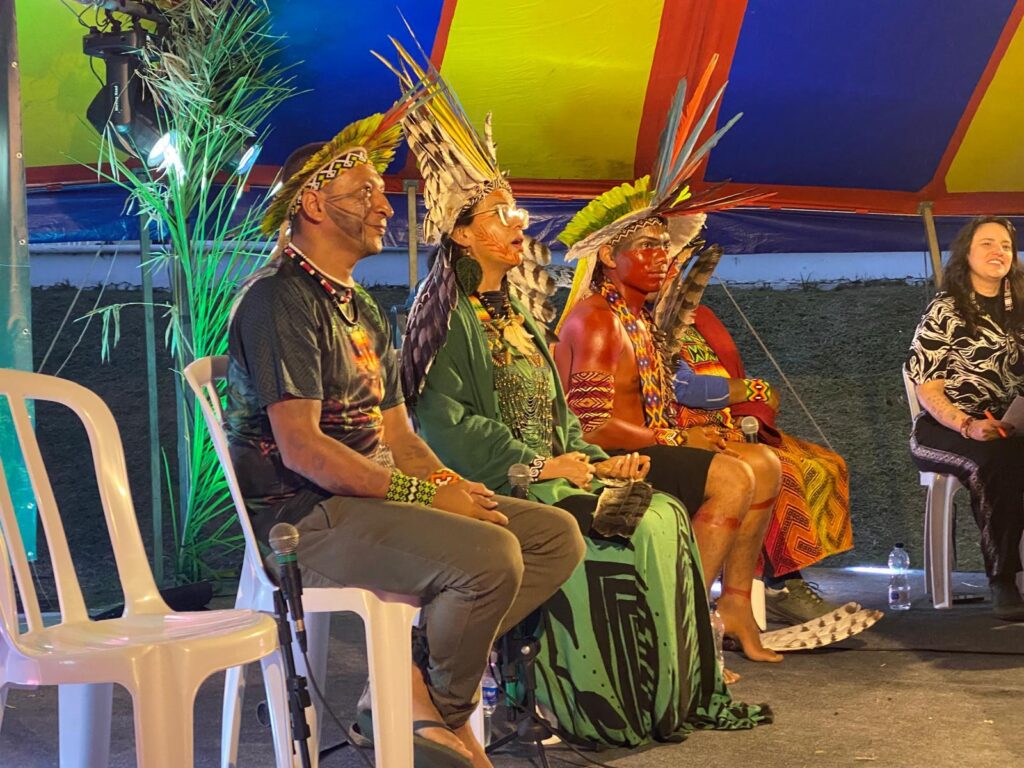
Makairy Fulni-ô spoke firmly and emotionally about the responsibility that comes with using these medicines. With more than 20 years of practice with jurema and ayahuasca, he recalled that true knowledge comes from real experience with the peoples who hold these traditions. He denounced Indigenous and non-indigenous people who appropriate this knowledge without preparation, and criticized those who, after just a few days in the forest, call themselves shamans or found spiritual centers. “God in liquid – that’s what ayahuasca represents for us,” he said. For him, medicine requires discipline, truth, and a deep spiritual connection.
At the end of the session, the Acre researcher and writer Jairo Lima gave a “straight talk” about the impacts of cultural appropriation practiced by non-indigenous people. Having shared experiences with the Ashaninka, Yawanawá, and Huni Kuin peoples for decades, Jairo criticized the proliferation of mixed urban rituals, false titles such as “shaman” or “initiate,” and the creation of a parallel market that profits from the spirituality of Indigenous peoples. He stressed that non-indigenous people should recognize themselves as apprentices, not masters. “This is Indigenous territory. We are visitors,” he said. For him, it is necessary to restore listening, strengthen dialogue and seriously confront cultural emptying dressed up as spirituality.
Daiara Tukano … brought a strong denunciation of the globalization of ayahuasca and the appropriation of Indigenous knowledge. She pointed out that the plant’s scientific name carries the term “caapi,” of Tukano origin, and recalled that the spirituality of her people was harshly repressed by religious missions and colonial projects
On the evening of the third day, the FIUP experienced one of its most symbolic moments: an ayahuasca ceremony that brought together the different ethnic groups taking part in a collective ritual. Each people shared their songs, transforming the space into a large circle of exchange, respect and listening between different traditions. This ceremony reminded everyone that FIUP is, above all, a festival of encounter – where the word joins the song, and debate intertwines with spiritual experience. It is a space where debate is not the only focus and where knowledge circulates in multiple forms.
The last day of the event, although marked by the cancellation of the talk “The Standing Forest is the Best Business – Sustainable Economy of Native Peoples,” maintained the high tone of the festival. The absence of the planned debate in no way compromised the strength of the closing ceremony, which was marked by vibrant cultural performances. Dances, songs, and collective celebrations expressed the spirit of unity that permeated every day of the meeting. During the closing ceremony, Txai Suruí read out a letter that will be presented at COP30 in Belém, Pará, as a collective voice for Indigenous peoples in defense of life and the forest.
FIUP reaffirmed that the Indigenous struggle is also a celebration. The power of words was combined with the power of songs, medicines, and bodies in movement. It was a space for denunciation, yes, but also for the future: where diversity is wealth and ancestry is the horizon. A festival whose words and songs continue to reverberate and create new waves.
Art by Mulinga.
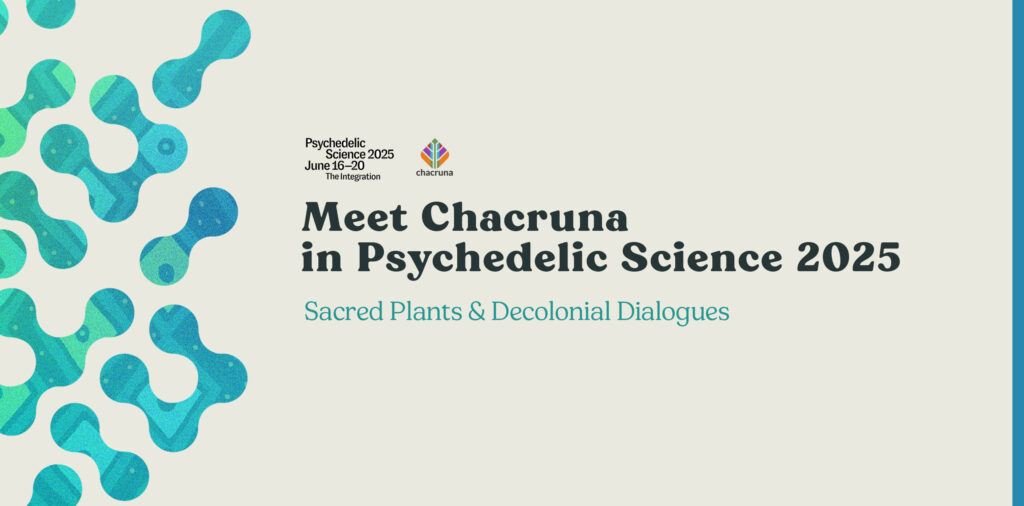
Meet Chacruna at Psychedelic Science 2025
Take a minute to browse our stock:
Did you enjoy reading this article?
Please support Chacruna's work by donating to us. We are an independent organization and we offer free education and advocacy for psychedelic plant medicines. We are a team of dedicated volunteers!
Can you help Chacruna advance cultural understanding around these substances?


